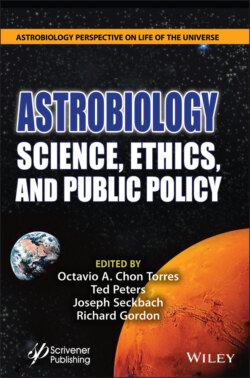Читать книгу Astrobiology - Группа авторов - Страница 23
2.2 Laying the Foundation for an Astroethics of Responsibility
ОглавлениеWhen NASA launched the New Horizons probe to Pluto in 2006, the Earth-relative launch speed was 36,000 miles per hour. After its sling from Earth’s orbital motion, it sailed toward the edge of our Solar System at 100,000 miles per hour. By 2018 the NASA launch of the Parker Solar Probe included an orbital velocity of 430,000 miles per hour. Science moves fast. Can ethics keep up?
“Space ethics appear today as a new terra incognita, an unknown country,” writes Jacques Arnould, astroethicist at France’s Centre National d’Etudes Spatiales (CNES). For this reason Arnould likens space ethicists to pioneers. As pioneers, space ethicists should begin their journey with humility, seeking first to learn the new territory. “That is the reason too why the first challenge is not to organize, to legalize and to reduce ethics to its repressive aspect. At the present time, we need to explore the field of space ethics. We need to determine the responsibilities; and to debate them. Major decisions about space cannot remain in the hands of individual leaders or the property of politic, scientific or financial lobbies” [2.2]. Here I intend to “determine the responsibilities” by constructing an Astroethics of Responsibility.
Astroethicists are pioneers. While astrobiologists are exploring the heavens, the ethicists are exploring the astrobiologists. Astrobiology needs more than science to explore astroethics. Astrophysicist Neil deGrasse Tyson puts a fence around science. “The methods of science have little or nothing to contribute to ethics, inspiration, morals, beauty, love, hate, or aesthetics. These are vital elements of civilized life, and are central to the concerns of every religion. What it all means is that for many scientists there is no conflict of interest” [2.84]. For ethical inspiration, the astroethicist must draw upon extrascientific sources. In this case, we will draw on the religious notion of the common good and the naturalistic notion of responsibility.
The core maxim derived from a naturalistic contribution to responsibility ethics is this: respond with care. I rely for this core maxim on the late Hans Jonas, a Jewish philosopher who parses the role of the “ought” when envisioning what “ought” to be done. Responsibility responds to the “forward determination of what is to be done,” he observes. “First comes the ought-to-be of the object, second the ought-to-do of the subject who, in virtue of his power, is called to care” [2.36]. As living creatures, we are called by the natural domain to care. We are to care for all that lives. “Only what is alive, in its constitutive indigence and fragility, can be an object of responsibility” [2.36].3 In this treatment I explore the question: can Jonas’ notion of responsibility help us lay the foundation for an Astroethics of Responsibility [2.63]? My answer is affirmative.
